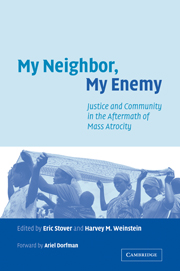Book contents
- Frontmatter
- Contents
- List of contributors
- Foreword by Ariel Dorfman
- Acknowledgments
- Introduction: conflict, justice and reclamation
- Part I Institutional approaches to justice
- 1 A world unto itself? The application of international justice in the former Yugoslavia
- 2 Legal responses to genocide in Rwanda
- 3 Localizing justice: gacaca courts in post-genocide Rwanda
- 4 Exhumation of mass graves: balancing legal and humanitarian needs
- 5 Witnesses and the promise of justice in The Hague
- 6 Reparations in the aftermath of repression and mass violence
- Part II Social reconstruction and justice
- Part III Survivors and justice
- Conclusion: a common objective, a universe of alternatives
- Index
5 - Witnesses and the promise of justice in The Hague
Published online by Cambridge University Press: 05 May 2010
- Frontmatter
- Contents
- List of contributors
- Foreword by Ariel Dorfman
- Acknowledgments
- Introduction: conflict, justice and reclamation
- Part I Institutional approaches to justice
- 1 A world unto itself? The application of international justice in the former Yugoslavia
- 2 Legal responses to genocide in Rwanda
- 3 Localizing justice: gacaca courts in post-genocide Rwanda
- 4 Exhumation of mass graves: balancing legal and humanitarian needs
- 5 Witnesses and the promise of justice in The Hague
- 6 Reparations in the aftermath of repression and mass violence
- Part II Social reconstruction and justice
- Part III Survivors and justice
- Conclusion: a common objective, a universe of alternatives
- Index
Summary
One day in February 1998, as a Croatia Airlines flight made its final descent into Zagreb, a man we will call Dean Levic leaned his forehead against the plane's window and gazed down on the red-tiled roofs of his homeland. The day before, in The Hague, he had held a courtroom spellbound as he described how, seven years earlier, Serb troops had removed over 200 men from a hospital in his hometown and gunned them down on a remote farm in eastern Croatia. Sitting only a few yards away from one of the men accused of ordering the massacre, Dean had been surprised, astonished even, at his own poise and confidence on the stand. Not even the defendant's attorney, a top Belgrade lawyer, was able to rattle him. But now, as the plane pressed down onto the tarmac, Dean began to wonder if he had done the right thing.
On his way home, Dean felt that fear was beginning to commandeer his thoughts. Although his name had not been disclosed at the trial, he was sure that word had already leaked out about his testimony. It had happened to other protected witnesses, including a neighbor who had returned home to find a death threat spray-painted across the windshield of his car. If his boss, a Serb, caught wind of his testimony, Dean was sure he would be fired on the spot. Then there was the problem of his wife.
- Type
- Chapter
- Information
- My Neighbor, My EnemyJustice and Community in the Aftermath of Mass Atrocity, pp. 104 - 120Publisher: Cambridge University PressPrint publication year: 2004
- 15
- Cited by



